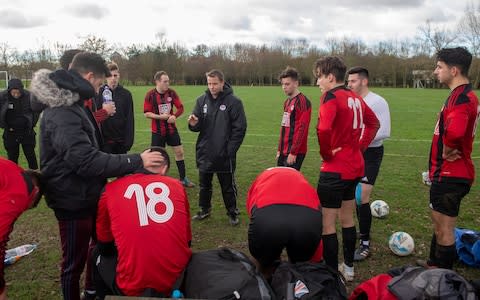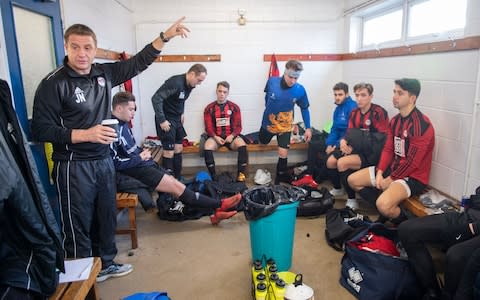Special report: 'Chelsea incident just serves to highlight the problem' – anti-Semitism on rise in grass-roots game

As Chelsea face a partial closure of Stamford Bridge in the Europa League after anti-Semitic chanting by fans, Telegraph Sport investigates anti-Jewish abuse beyond the game's elite and discovers a wave of discrimination in the grass-roots has taken hold
The outpouring of bile from the terraces in Budapest on Thursday was recognised with a shrug by team-mates from amateur club Brady Maccabi. Abuse has become so bad in the London Sunday leagues that they have been forced to call in police.
"It's been shocking – we have been right on the receiving end of the far right revival," says chairman Joel Nathan, who looks after 23 teams, with players aged eight to 80. "Sunday football is meant to be enjoyable experience, yet now there is always a risk."
Team-mates, whose great-grandparents took part in the Battle of Cable Street to halt Sir Oswald Mosley's goose-stepping Blackshirts in 1936, suffered their lowest point after an under-16s match. One of the players got home from school one day to find a member of the opposition had called him “Jew boy”, “gay Jew” and “Nazi victim” in social media posts. References to the team “taking a gas shower” had also been written on Instagram in a private chat group.
Anti-Semitism, as far as the club is concerned, is as bad in the grass-roots game it has been for at least 20 years. Nathan added: "We used to get the odd comment when I was in my 20s playing non-Jewish sides, but, two decades on, it's come back again. It's as bad, if not worse. The habits have been passed on to younger kids. Those below the ages of 14 might not know what they are saying, but, anything older, you have to say there is a real problem there."
His assessment is supported by the statistics. In 2017/18, the anti-discrimination charity Kick It Out revealed that 52 attacks – 10 per cent of all reports to the organisation – related to anti-Semitism. Overall, reports of discriminatory abuse within football were up 11 per cent last season, the sixth successive annual rise.
While attacks on Raheem Sterling, Pierre-Emerick Aubameyang and chants on the terraces of Premier League clubs gain most attention, campaigners say the most insidious abuse can often be found further down football's pyramid.
Dave Rich, head of policy at the anti-Semitism monitoring body CST, told Telegraph Sport: "The Chelsea incident just serves to highlight the problem."

There have already been 16 anti-Semitic incidents reported to him between January to June this year, but Rich suggested the majority of attacks are going unreported because it has become institutionalised in the game.
"We know a lot of these incidents are going unreported, especially in Sunday league," he added. "A lot of people almost seem to accept it as something that happens in football and that's where awareness campaigns are so important. Anti-Semitism has definitely increased in recent years and football has incredible power on broader attitude."
Nathan, meanwhile, believes the authorities need to show more leadership to ward off a potential crisis in the sport. "The education of the Holocaust and everything the Jewish people went through seems to have been lost. Education is key to sorting this out It's for the FA to deal with it and make sure they deal with it in the strongest sanctions."
The Instagram attack took place in April last year after Brady Maccabi beat Enfield-based Olympiakos 3-1 in the Watford Friendly League. Teenager Joel Freedman was among the players targeted by abuse, and described recently how opponents had said "Hitler was right", "the gas chambers were a good thing" and "we should all get gassed."
Nathan reported the incident to Maccabi Great Britain, the police and the Community Security Trust (CST). The opposition player was interviewed by officers, fined £75 by the FA, banned for four matches and sent on an awareness course.
"We really need to see the governing bodies and police take the issue more seriously," Nathan said. "Looking back at history these are worrying times. We just want to play football, but there's certain things that do cross the line and people are right not to accept them. There is no doubt in my mind that anti-Semitism is rising again."
There around 100 amateur Jewish clubs across the UK, with dozens of teams in London alone, however, the strong presence is not reflected in the professional game. Despite many Jewish chairmen and owners in the Premier League, Joe Jacobson, of Wycombe Wanders, believes he is one of fewer than 10 Jewish players in the top four divisions.

Many perceptions of the presence of Jewish communities in football also appears to be wrong. A 2016 article from The Jewish Chronicle estimates that only around five per cent of the crowd at Tottenham Hotspur are actually Jewish, yet Tottenham's long association with the local Jewish community has seen their fans and players fall victim to regular abuse. A row has also lingered for years at Spurs over fans adopting the term “yid” in a bid to neutralise the derogatory term.
The comedian David Baddiel and his brother, Ivor – both Chelsea supporters – launched a campaign to encourage Tottenham fans to stop using the phrase, and a year later the Society of Black Lawyers threatened to report the club to the police if it failed to crack down on the chants. In 2013 the Metropolitan Police told Tottenham fans using "yid" in chants that they could face arrest, although this was reversed six months later after pressure from the Tottenham Hotspur Supporters’ Trust. It is still an offence, however, for opposition fans to supporters the term in a malicious way, and many clubs have committed to imposing lifetime stadium bans on offenders.
The Spurs Supporters Trust declined to comment when approached by Telegraph Sport, but Rich, of CST, said: "The word yid is a racist insult against Jews. It's still used in wider society away from football. the idea of it being used by football fans doesn't sit well. It's very positive that Spurs embrace that connection with the Jewish community, but the use of that word is something that we would prefer they didn't use. This however does not justify the anti-Semitic abuse that gets used against Spurs fans."

Chelsea, meanwhile, had been desperately working with Kick It Out to eradicate anti-Semitism before events this week. The club has criticised its fans before: for abusive chanting against rivals Tottenham in September last year. Since then, the club’s owner, Roman Abramovich, is Jewish and has been at the forefront of an initiative to send racist supporters on trips to the Nazi concentration camp Auschwitz instead of imposing banning orders.
A delegation from the club flew to Auschwitz for the annual March of the Living in April, while 150 staff and supporters went on a day trip in June to the site which once housed Nazi death camps while Poland was under German occupation. “If you just ban people, you will never change their behaviour,” the Chelsea chairman, Bruce Buck, told The Sun recently. “This policy gives them the chance to realise what they have done, to make them want to behave better. In the past we would take them from the crowd and ban them, for up to three years. Now we say: ‘You did something wrong. You have the option. We can ban you or you can spend some time with our diversity officers, understanding what you did wrong."
Last week Kick It Out released a video raising awareness of anti-Semitism, made with Chelsea and Ivor Baddiel. The film was shared by Rachel Riley, the Countdown presenter, who then herself faced abusive comments on Twitter. She has since posted that people should “think carefully before accidentally adding fuel to the flames of anti-Semitism, whatever your motivation.”
Kick It Out also issued a training guide for match-day stewards at Chelsea to help improve awareness of anti-Semitic behaviour – and the role they and their club play in tackling it. The campaign group has welcomed Chelsea's condemnation of their fans.
"I think there is evidence that people are coming out and showing leadership now," says Jacobson, the Wycombe defender, who also works as an ambassador at Kick It Out. "We need more of that."
For Brady Maccabi, change cannot come soon enough. "Often it's the grass-roots that can be forgotten," said Nathan. "We'll know the reforms are working when we are not facing abuse on a weekly basis."
'There's a culture that it's okay to shout anything in a football stadium, which is just wrong'
By Joe Jacobson, Wycombe defender and Kick It Out Ambassador
When I made my debut for Cardiff City in 2005, I think I was the first British-born Jewish player to play in the Football League in 25 years.
Football is such a huge part of the Jewish community and we all have work to do to help more families get the opportunities, and feel reassured, about letting their children join professional clubs.
Firstly, we must have sanctions to ensure the term “yid” is not used in society, let alone near a football terrace. Uefa and Fifa have thrown fines around, but these are just pennies to the clubs. This is not going to change anything.
The issue with Tottenham fans using the word needs to be addressed. It is difficult to expect others to avoid it when they are using it about themselves. Tottenham fans do need to come together and say “you know what, we really do need to eradicate it from our terraces”.
You do not have to say that word to support Tottenham. There are plenty of other things to sing about. I really do believe other teams might think twice then, and if they do not, more can be done about it. If Tottenham stop using the word, the sanctions can become a lot stronger, tougher and transformative.
What troubles me most is that these people are walking away from matches and taking these issues into society. There is a culture that it is OK to shout anything in a football stadium, which is just wrong. It helps solidify a feeling of them and us. If these people hate certain minorities, we are only going to change that through education, not only within football but in life. These are people’s cultures and backgrounds.
I do not know how it is ever going to stop, but education can only help. Get these people on the courses. Show them what actually happened during the Holocaust. They will soon realise what they are doing and why it is so bad.

I have never heard anything anti-Semitic while I have been playing, but perhaps that is because the clubs I have played for do not have the same reputation as somewhere like Spurs, where there is regular abuse.
The Tottenham fans encounter hissing noises and Nazi salutes. It is unacceptable and I think it is coming from a lack of education.
I have been working with Kick It Out for several years and we work in the community. Discrimination is so obvious now, but I think we need to keep in mind that there is a positive, because people are becoming more and more willing to report it. There are apps where people can flag these up and cameras everywhere are making perpetrators more accountable.
In terms of British Jewish footballers, I think there are only two or three outside of Wycombe, where there are two. There is a couple of Israelis in the Championship and Premier League, but apart from that, I do not think there are 10 in the top four divisions.
It is a strange one because there are so many Jewish owners in the Football League. About half the owners and chairmen in the Premier League are of Jewish descent.
Troy Townsend spoke this week about the lack of black faces in the boardroom, but for the Jewish community that challenge is out on the pitch.
Fans would not look at me and think immediately that I might be Jewish.
Probably 99 per cent of them simply would not know. Whether you are black or white, people can see that immediately. So, obviously, what we have seen with Raheem Sterling, those fans that were giving him abuse are judging him simply by his skin colour.

That is where it is slightly different for the Jewish community. A lot of the judgment is based on background instead. I think there is evidence that people are coming out and showing leadership now. We need more of that. More of people coming out and being counted.
Maybe clubs should be doing their bit, too. Working with the communities is always important, but perhaps clubs should think more about including Jewish people as part of their plans.
There is perhaps a stereotype of Jewish people not wanting to go into playing football because parents want them to secure more reliable jobs.
Perhaps that comes from Jewish people themselves, but I do know from my friends and family, football is just as big a deal for Jewish people as it is for anyone else. It is hard for me to say, but the shortage of Jewish players just does not add up. We need to be certain that they are getting as much opportunity as anyone else.
That is the long-term challenge, but, today we need to see the governing bodies really stamping down on terrace abuse. Clearly, something is not working.
Any form of discrimination in football, including anti-Semitism, can be reported to Kick It Out via the organisation’s app, email (report@kickitout.org), freephone (0800 169 9414) or website.

 Yahoo Sport
Yahoo Sport 





































